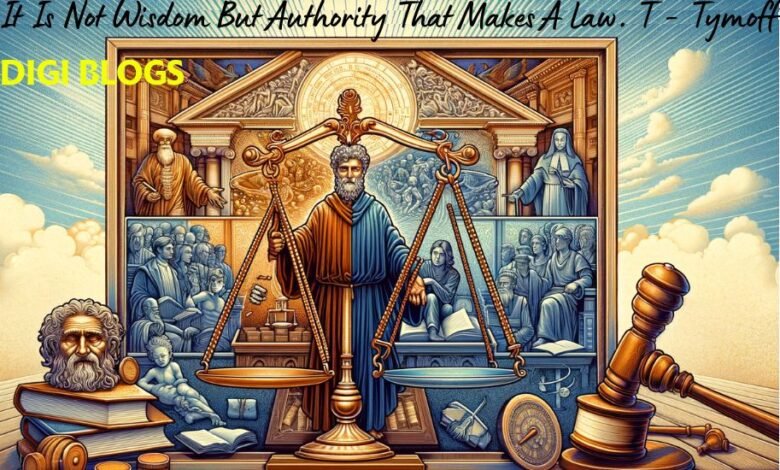
In the vast landscape of jurisprudence, the statement It Is Not Wisdom But Authority That Makes A Law. T – Tymoff stands as a profound exploration into the dynamics of legal systems. This article delves into the historical contexts, philosophical underpinnings, and the enduring tug-of-war between wisdom and authority in the creation and enforcement of laws. Through a detailed examination, we aim to uncover the layers beneath Tymoff’s assertion and its implications on our understanding of law and governance.
The Foundation of Legal Systems: Authority’s Primacy
At the core of legal systems lies the principle of authority — the legitimate power vested in entities to create, enforce, and Interpret laws. This authority ensures the adherence of citizens to the established legal framework, providing stability, order, and a mechanism for dispute resolution within society. The enforcement power, vested in authorities, dissuades unlawful behavior through the fear of consequences, thus maintaining the societal fabric intact. However, the concentration of authority can lead to an imbalance, potentially skewing justice towards those in power, emphasizing the critical need for checks and balances to prevent abuse.
Historical Perspectives on Lawmaking
From ancient codes that combined ethical precepts with authoritarian control to modern democracies where laws are meant to reflect the wisdom of the populace, the evolution of lawmaking highlights a varied approach to balancing wisdom and authority. The annals of history, ranging from Hammurabi’s Code to the legal frameworks of modern states, showcase how different eras and societies have navigated the complexities of law creation. Each period reflects a unique blend of authority and wisdom, adapting to societal needs, ethical standards, and technological advancements to maintain relevance and fairness.
Wisdom vs. Authority: The Age-Old Debate
While authority enforces the law, wisdom is crucial in shaping laws that are equitable, considerate, and reflective of societal complexities. Ancient civilizations and philosophical doctrines emphasized the role of wisdom in lawmaking, believing in the moral and ethical foundation of legal systems. However, as Tymoff’s statement suggests, regardless of the wisdom behind them, laws gain their true force through authority. This interplay between wisdom and authority remains a central theme in contemporary legal and philosophical debates, underlining the importance of balancing both elements to achieve just and effective governance.
Modern Legislative Challenges and Solutions
In today’s complex world, the task of crafting legislation that adeptly balances wisdom and authority becomes ever more challenging. Laws must navigate the intricacies of technology, economics, civil rights, and environmental science, among other considerations. Effective lawmaking requires an amalgamation of ethical principles, societal needs, democratic values, and innovation. By integrating these aspects, modern legal systems strive to maintain a delicate equilibrium between authority and wisdom, ensuring laws are both enforceable and just.
Tymoff’s Legacy: A Call for Balance and Reflection
The statement “It Is Not Wisdom But Authority That Makes A Law. T – Tymoff” serves as a catalyst for reflection on the nature of law and governance. It underscores the necessity for a nuanced understanding of how laws are created and the forces that shape them. In acknowledging the indispensable role of authority in giving laws their force, we must also recognize the value of wisdom in guiding the spirit of these laws. The dialogue sparked by Tymoff’s assertion encourages a continual reassessment of our legal systems, urging a synergistic approach that values both wisdom and authority in the pursuit of justice and societal well-being.
In conclusion, the intricate dance between wisdom and authority in the realm of Law underscores the complexity of governance and legal theory. Tymoff’s profound statement highlights the essential nature of authority in the enactment of laws while reminding us of the indispensable role of wisdom in shaping a just and equitable society. As we navigate the evolving landscape of modern legal challenges, the balance between these two forces remains paramount, guiding the path toward fair, adaptive, and enduring legal frameworks.




